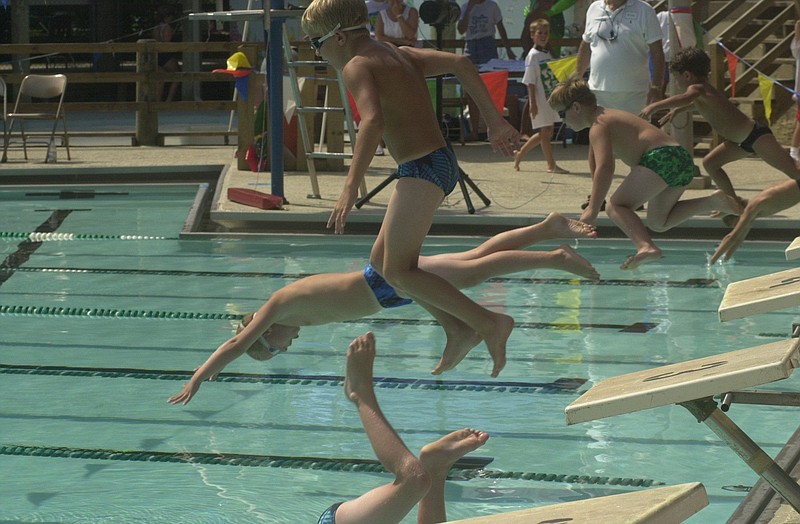Signal Mountain pool fees may be different by the time swimmers dive in later this month.
The Signal Mountain Town Council was expected to have its first reading of an ordinance that could increase pool fees during its regularly scheduled meeting May 8.
Right now, the daily entry fee for the pool is $2 for seniors and children age 5 and under, $3 for children ages 6-12 and $4 for swimmers 13 and older.
If approved on first and second reading, the price of admission will change to $5 for seniors and children 5 and under, and $7 for everyone 6 and older. The $200 price for a season pass, however, will remain the same.
The changes could be implemented in time for pool season, which begins May 27.
The council is also considering increasing the annual fee nonresidents must pay to obtain a resident card for the pool, from $100 to $125, for future seasons. Right now the only change to the resident card in the proposed ordinance is the inclusion of a $20 weekly pass for short-term visitors not interested in paying for the yearlong resident card.Resident cards are required to enter the pool, but the cards are free to town of Signal Mountain residents, whose costs are covered through property taxes.
According to Recreation Director Jarred Thompson, 40-45 percent of the pool's users are nonresidents.
The pool entrance fee ordinance surfaced during 2017-2018 fiscal budget discussions in an attempt to increase the amount of revenue flowing into the town.
The town's revenue stream has been decreasing at an average rate of about 4 percent per year, while its expenses have consistently increased at a rate of 8-10 percent, Mayor Chris Howley said during a town council work session April 29. Signal will feel that deficit more so this year than previous ones due to the gradual loss of the Hall tax revenue, which town officials said generated an average of $750,000 each year for the last three years, as well as other necessary expenses.
"This is going to be our toughest budget run that I've seen so far," Howley said. " We have to look at cuts, raising additional revenue sources or increasing fees through taxes or user fees."
In addition to rethinking pool fees, council members re-evaluated the recreation department's maintenance projects to determine what should be a priority and what could be postponed.
Thompson advocated for a $90,000 reconstruction project for two of the town's six tennis courts, citing the $4,000 to $5,000 spent each year for their temporary repair. The council also designated a $30,000 project for the gym a priority because it included a new heating, ventilation and air-conditioning unit, which officials said would be necessary to accommodate activities displaced while part of the Mountain Arts Community Center is closed for repairs.
Projects labeled for potential deferral included replacing playground equipment at Timberlinks Park, and improvements to Wagner, Marion and Driver sports fields. Tabling these projects would save the town almost $100,000, Howley said.
Vice Mayor Dick Gee expressed concerns about pushing back the maintenance projects. He said budget expenses have been increasing in part because past councils decided they would not continue to let the town fall into ruin, and he worried the assets predecessors paid to protect would fall out of operating condition if the current council postponed projects year after year.
"I want citizens to be proud of the community," Gee said, adding, "Are we going to be country-shabby? Rustic and dilapidated? Or are we going to be first-class?"
Howley disagreed, saying the fields have been in their current - usable - condition "forever," and the improvements in the proposed fiscal budget are meant to take them a step further, not save them from ruin.
"I'm not saying I'm for or against [these cuts]. We've just got to look at it," Howley added.
The council also began looking into restructuring the way nonresidents pay to play in recreational leagues.
Players pay a league fee to participate in the sport of their choice, but they are also required to pay a town fee: $35 per family to use the fields and $12 per family to use the gym.
As the leagues have begun collecting fees online, however, the town fee has often gone unpaid, officials said, and Howley estimated the town is only collecting fees from 70 percent of players.
"It's not a matter of blame," said Town Manager Boyd Veal. "It's just the way things have happened."
The new proposed system would work similar to the resident card needed to use the pool. Players would receive a card after they've paid the town fee for the field or gym, and they would be required to enter the number from their card before filling out the rest of their league registration form online. If the fee went unpaid, the league would be responsible for making up the discrepancy.
Since the town does not control league fees, officials would have to coordinate their efforts with league heads to implement the change.
Veal stressed that this is only one possible approach to improving the collection system, and it is subject to change as budget discussions continue.

